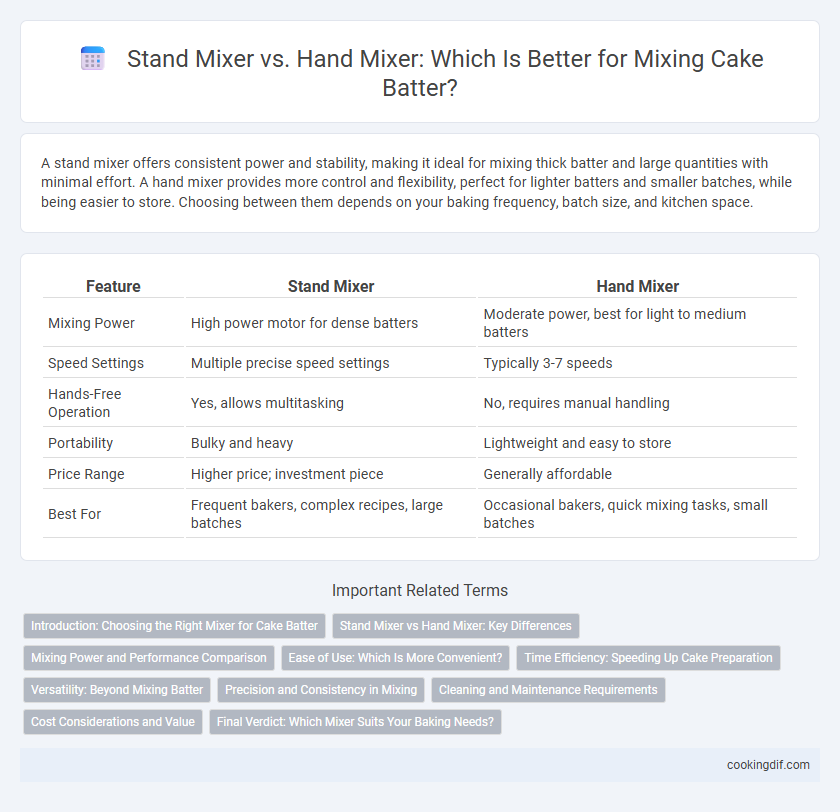A stand mixer offers consistent power and stability, making it ideal for mixing thick batter and large quantities with minimal effort. A hand mixer provides more control and flexibility, perfect for lighter batters and smaller batches, while being easier to store. Choosing between them depends on your baking frequency, batch size, and kitchen space.
Table of Comparison
| Feature | Stand Mixer | Hand Mixer |
|---|---|---|
| Mixing Power | High power motor for dense batters | Moderate power, best for light to medium batters |
| Speed Settings | Multiple precise speed settings | Typically 3-7 speeds |
| Hands-Free Operation | Yes, allows multitasking | No, requires manual handling |
| Portability | Bulky and heavy | Lightweight and easy to store |
| Price Range | Higher price; investment piece | Generally affordable |
| Best For | Frequent bakers, complex recipes, large batches | Occasional bakers, quick mixing tasks, small batches |
Introduction: Choosing the Right Mixer for Cake Batter
Stand mixers provide powerful, consistent mixing ideal for dense cake batters and large batches, ensuring smooth texture and even ingredient incorporation. Hand mixers offer lightweight, portable convenience suited for smaller or lighter cake batters, with easy maneuverability for delicate folding and whipping tasks. Selecting the right mixer depends on batch size, batter consistency, and preferred mixing control to achieve optimal cake quality.
Stand Mixer vs Hand Mixer: Key Differences
Stand mixers feature a powerful motor and stable base, allowing for thorough and consistent batter mixing, especially for thick or large batches, while hand mixers offer portability and ease of use for smaller or lighter tasks. The stand mixer's multiple attachments, including dough hooks and paddle beaters, provide versatility beyond what typical hand mixers achieve. Hand mixers are generally more affordable and compact, making them suitable for occasional baking and quick mixing jobs.
Mixing Power and Performance Comparison
Stand mixers deliver superior mixing power with robust motors typically ranging from 250 to 1000 watts, enabling them to handle dense cake batters effortlessly and maintain consistent speed. Hand mixers usually offer lower wattage between 150 to 300 watts, suitable for lighter batters but may struggle with thick mixtures, leading to longer mixing times and uneven texture. For optimal performance in mixing cake batter, stand mixers provide more thorough and efficient blending, ensuring better aeration and smoother consistency compared to hand mixers.
Ease of Use: Which Is More Convenient?
Stand mixers offer hands-free operation and greater stability, making them more convenient for prolonged mixing tasks and heavy batters. Hand mixers provide portability and simpler cleanup, ideal for quick jobs or small batches with less mess. Both prioritize ease of use, but stand mixers excel in convenience for frequent, intense baking.
Time Efficiency: Speeding Up Cake Preparation
Stand mixers significantly reduce cake preparation time by delivering consistent, high-powered mixing ideal for dense batters and large batches. Hand mixers offer more control but require longer mixing durations, making them less efficient for time-sensitive baking. Choosing a stand mixer accelerates the blending process, ensuring smoother batters with minimal effort.
Versatility: Beyond Mixing Batter
Stand mixers offer greater versatility beyond mixing batter, equipped with various attachments for kneading dough, whipping cream, and even making pasta or grinding meat. Hand mixers provide convenience and portability, suitable for lighter tasks such as whipping eggs or combining ingredients in smaller quantities. Both tools serve distinct kitchen needs, but stand mixers excel in handling a wide range of baking and cooking processes efficiently.
Precision and Consistency in Mixing
Stand mixers provide superior precision and consistency in mixing batter due to their powerful motors and stable design, allowing even blending of ingredients at variable speeds without manual effort. Hand mixers, while convenient for smaller batches, often result in uneven mixing and less control over speed settings, which can compromise batter texture and rise. For achieving the perfect cake batter consistency and texture, a stand mixer is the optimal choice for home bakers and professionals alike.
Cleaning and Maintenance Requirements
Stand mixers generally require more time for cleaning due to their larger size and multiple attachments, but their removable parts are often dishwasher-safe, simplifying maintenance. Hand mixers are easier to clean quickly since they have fewer components and are lighter, but their beaters may need thorough washing by hand. Both appliances benefit from regular wiping of the motor housing to prevent buildup and ensure long-term performance.
Cost Considerations and Value
Stand mixers typically come with higher upfront costs ranging from $200 to $500, but their powerful motors and attachments provide long-term value for frequent bakers. Hand mixers are more affordable, usually priced between $20 and $70, offering convenience and portability ideal for simple tasks and occasional use. Evaluating budget constraints alongside baking frequency helps determine which mixer delivers the best cost-to-performance ratio for mixing batter.
Final Verdict: Which Mixer Suits Your Baking Needs?
Stand mixers offer superior power and stability, making them ideal for dense cake batters and frequent bakers who require hands-free operation. Hand mixers provide lightweight convenience and easy storage, perfect for simple cakes and occasional use. Choosing between a stand mixer and a hand mixer depends on the volume, mixing intensity, and versatility needed for your baking projects.
Stand Mixer vs Hand Mixer for mixing batter Infographic

 cookingdif.com
cookingdif.com